There isn’t much left of the Never Trump movement, I realize, but I did not anticipate that a formal surrender might air on The Resistance’s favorite network.
Watch the first five minutes of this clip, which knocked political media for a loop on Monday.
Morning Joe is MSNBC’s flagship morning news program, famously wielding outsized influence within official Washington like a cable-news version of Politico’s Playbook. And while the relationship between Trump on the one hand and hosts Joe Scarborough and Mika Brzezinski on the other has always been … complicated, the two have been harsh critics of Trump for most of the last eight years.
Like, really harsh. “Qualified to guest-write this newsletter when I’m on vacation” harsh.
Until this morning, that is. “Joe and I realized it’s time to do something different and that starts with not only talking about Donald Trump, but also talking with him,” Brzezinski announced, revealing that the pair visited Mar-a-Lago last Friday. “We know this will be a consequential presidency. The question is whether it will be constructive. It will take a new approach from all sides, from both parties, and a leader who can bring them together and only time will tell if Donald Trump can be that leader.”
On both the right and left, news of the rapprochement was received just as you’d expect.
Detecting an ulterior motive here doesn’t require much imagination. Maybe Joe and Mika fear a victorious Trump’s “retribution” and are keen to suck up before Attorney General Matt Gaetz sics the secret police on them—and they might be right to fear that. Or perhaps the two worry that their network will be frozen out by a Trump-dominated government and are hurriedly building bridges in order to gain access to sources and line up future guests.
Or it could be that this is nothing more or less than a desperate bid for relevance, the latest of many examples of anti-Trump broadcasters realizing belatedly that the country doesn’t share their antipathy to him and choosing to join Team MAGA in order to grow their following.
I don’t think any of those theories correctly explains what Scarborough and Brzezinski are up to, though. (Especially the last one. MSNBC isn’t about to start cheerleading Gaetz’s confirmation.) As others have noted, the language the two used to describe their visit with Trump was striking in how it mirrored diplomatic rhetoric. At one point, Brzezinski said they had agreed with the president-elect to “restart communications” and noted that her famous father “often spoke with world leaders with whom he and the United States profoundly disagreed.”
They seem to have viewed their trip as a diplomatic visit by emissaries from one country to the hostile leader of another, a fair analogy for where things stand in the United States at this moment.
Hostage negotiations.
“Jaw-jaw is better than war-war,” Winston Churchill supposedly (but never quite) said. Classic diplomacy occurs when two evenly matched rivals try to resolve their differences peacefully because the cost of resolving them militarily would be terrible to both.
Sometimes, however, diplomacy is less a dialogue between equals than a hostage negotiation. One side might be conspicuously weaker than the other and eager to plead for mercy before an attack. Or one might be led by someone who’s belligerent and off-kilter, forcing the other to call for talks in hopes of reasoning with him before he does something nutty. Or both: Western Europe’s diplomacy toward Vladimir Putin before the invasion of Ukraine was a case of begging a madman to act responsibly for fear that his army couldn’t be stopped.
That didn’t work, but “hostage negotiation” diplomacy does sometimes succeed. Modern outreach to North Korea has flattered a rogue regime’s ego just enough to persuade it not to blow up the Korean peninsula. Ages ago, Pope Leo rode out to meet Attila before his barbarian army could lay waste to Rome and, somehow, managed to talk him out of it.
I think that’s what Scarborough and Brzezinski had in mind when they went to Mar-a-Lago last week.
Had they made the same effort in 2016—actually, they did make the same effort in 2016—the two sides would have been more evenly matched. Sure, Trump was the newly elected president at the time, but his Democratic opponent had received more votes and he faced an array of popular and institutional obstacles to imposing his will on government. The Resistance was large and spoiling for a fight; official Washington was dominated by classical liberals in both parties; and even Trump’s own Cabinet nominees resembled Joe Scarborough politically more than they did the president-elect.
Diplomacy between Trump and anti-Trumpers under those circumstances was more akin to a meeting of equals to avert war. Diplomacy under the current circumstances resembles the summit between Leo and Attila, a plea for mercy by one side as the other prepares to light a country on fire.
Trump won the popular vote this time. The Resistance is exhausted and demoralized in defeat and unlikely to resort to the same muscle-flexing it did in 2017 with demonstrations like the Women’s March. And the president-elect has assembled a kakistocracy to staff his new administration: Robert Tracinski has aptly described Trump’s new Cabinet nominees as “not merely unqualified for their offices. They are disqualified. They are anti-qualified—the antithesis of what the offices call for.”
The two sides of the Trump divide are no longer equally matched. I think the Morning Joe hosts recognized that and concluded that the most productive thing they can do at this point to try to rein him in is to swallow their pride, meet with Attila, and politely ask him not to burn Rome to the ground.
It might help! Trump is freakishly susceptible to flattery, particularly when it involves former critics crawling to him and asking to be friends. (He made one of them his new vice president, didn’t he?) And there are precious few dissenting voices like Scarborough’s or Brzezinski’s in his ear at this stage of MAGA’s decline into raw cultism. All the John Kellys and James Mattises have been purged, after all, replaced by yes-men no more moral or civically minded than Trump himself.
Joe and Mika may have felt obliged to bury the hatchet with him just so that someone whom he regards as “friendly” can tell him that putting Robert F. Kennedy Jr. in charge of vaccine regulation is insane. Trump 2.0 will be one long hostage negotiation in that same vein: When there’s no other way to stop a dangerous man from doing immense damage, your best play is to get him on the phone and try to talk him into doing the right thing voluntarily, before anyone gets hurt.
Many others will follow that approach as Trump goes about consolidating power and turns the federal government into a system of patronage for his friends and harassment for his enemies. That’s part of what fascinates him about tariffs: He can grant exemptions to allies while punishing adversaries as he likes. In a monarchy, which is functionally what American voters chose on Election Day, policy is set according to the king’s whims. Scarborough and Brzezinski are adapting to that new reality and doing what little they can do to try to steer His Majesty in a less tyrannical direction.
I think that also explains Joe Biden’s decision to invite Trump to the White House last week.
Presidential diplomacy.
I’m not opposed to Joe Rogan’s theory that Biden held a photo op with Trump purely to spite Democrats after they prevailed upon him to quit the race in July. It’s a fun possibility. He did seem awfully tickled to be hosting a guy who tried to stage a coup that would have kept him out of office four years ago.
My guess, though, is that the president was behaving diplomatically, understanding that the biggest restraint on Trump’s authoritarian impulses until after the next midterm election at the earliest will be his own willingness to follow through on them. The Republican House won’t do a thing to stop him; the Republican Senate finding four GOP votes to reject even his most despicable nominees will be a pleasant surprise. And the Supreme Court, having weakened the law’s ability to deter Trump earlier this year, might well do so again if he challenges its authority.
With institutional restraints at risk of collapsing, Biden and his staff may have made a strategic calculation that the best way to get a pathological narcissist to behave less vindictively is to appeal to his narcissism. Invite him to the White House. Pat him on the back. Compliment him on his victory. Treat him like a friend. Lead him to believe that other Democrats might also treat him in a friendly and respectful way if he keeps a lid on his worst impulses.
Coincidentally, that also describes how Western powers tend to approach rogue regimes diplomatically. If only you renounce dictatorship and embrace liberalism, you too might be welcomed into the community of nations. It’s worth a shot.
And even if it isn’t, what other option is there?
Reelecting an unstable authoritarian guaranteed that the most important day-to-day factor in American politics and policy for the next four years will be Trump’s mood. Joe Biden, like Joe Scarborough and Mika Brzezinski, appears to have recognized that and did what little he could to improve that mood by showing Trump some goodwill. When Mika described trying “something different” and taking “a new approach” in her comments on Monday’s program, that’s what she meant. Every attempt to deter Trump has failed: checks and balances, criminal indictments, impeachments, credible warnings about creeping fascism, desperate appeals to the better angels of our nature—all hand-waved away by the American voter.
All that’s left of deterrence now is trying to boost an aspiring caudillo’s mood by convincing him that those whom he’s traditionally thought of as enemies are actually potential friends, depending on how he behaves.
In practice, this amounts to a full capitulation to postliberalism.
Enemies, a love story.
The traditional post-election meeting in the Oval Office between the president and president-elect is like a post-game handshake between the teams in sports. It’s a formal reminder to both sides that they’re opponents, not enemies.
An opponent is someone against whom you compete according to an agreed-upon set of rules. In American politics, those are the rules of constitutional democracy—the majority gets its way but the power of the elected government is diffuse and circumscribed in some regards to protect the rights of individuals. Behaving cordially toward the winner after an election is the loser’s way of recognizing that both sides remain committed to the rules that govern us.
But postliberals aren’t committed to those rules. They’re not opponents. They’re enemies of liberalism.
They want power concentrated in a single leader, not dispersed among competing branches, which is why they’re rushing to turn the federal government into a “loyalty machine” before liberals can regain control of it. And they believe that rights should depend at least in part on allegiance to the leader: When the state behaves ruthlessly toward an individual, postliberal interest in the matter begins and usually ends with the question of whether that individual is friend or foe.
Because the liberal and postliberal visions are irreconcilable, the competition between them is less like a sport and more like a war. The supreme example was Trump’s 2020 coup plot, when he sought to void constitutional democracy’s guarantee that the majority gets its way. He and his supporters aren’t committed to the same rules that the rest of us are. There should be no post-game handshake after that.
The fact that Biden offered Trump one anyway last week, extending to an enemy of liberalism a courtesy previously reserved for partisan opponents, felt like an official surrender on behalf of the left to postliberalism for having successfully changed the rules that govern the country. Trump is no longer an enemy attacking the system from within; the system itself has been remade to incorporate his vision of government, per the verdict of American voters on November 5. That makes Trump an opponent, fully normalized, and due all the courtesies to which opponents are normally entitled. Biden, Scarborough, and Brzezinski are behaving accordingly.
Here again there’s a diplomatic analogy. The United States has refused to formally recognize Iran’s government for 45 years, as the ruling clerical regime is so hostile to America and its ideals that White Houses run by both parties have declined to grant it the legitimacy of full relations. One could argue that it would be immoral to do so given how the regime has oppressed the Iranian people. Withholding diplomatic recognition is a way to protest that oppression and signal our belief that the mullahs have no moral right to rule. They’re enemies.
That was roughly the way liberals, classical and otherwise, viewed Trump and his movement until November 5. Kamala Harris went as far to accuse him of being a fascist, an assessment with which the White House agreed. Hostile to American ideals, immoral and authoritarian by design, and sufficiently disliked that Trump lost the popular vote in 2016 and never once enjoyed a positive approval rating in his first term: MAGA’s weak legitimacy fueled the sense that it was an enemy of American ideals and the sense that it was an enemy fueled perceptions of its illegitimacy.
That’s gone now. You can (and should!) hate Trump’s form of politics, but if his reelection means anything it’s that Americans have chosen to grant formal recognition to postliberalism as a viable model for the United States. On Twitter this morning, one person sneered at Morning Joe’s reunion with the president-elect as supposed proof that “Democrats never actually thought Trump was Hitler or a fascist dictator,” but that’s wrong. They do think it and are already being proven right about it; it’s just that American voters didn’t care, at least relative to inflation and immigration, so now those of us who do are forced to somehow make the best of an impossibly terrible situation.
We had a test of civic wills and the bad guys won. If you’re mad at Joe Biden or Morning Joe for recognizing that by riding out to meet Attila, you’re shifting the blame from where it belongs.
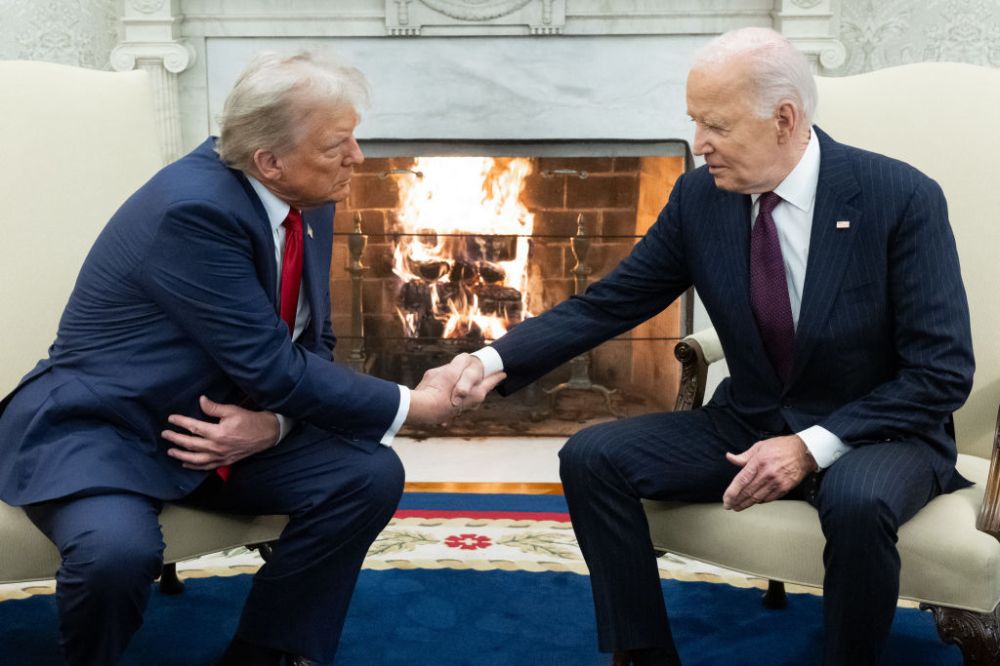

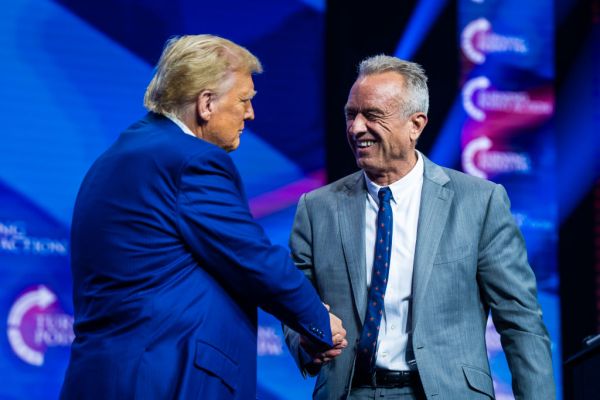
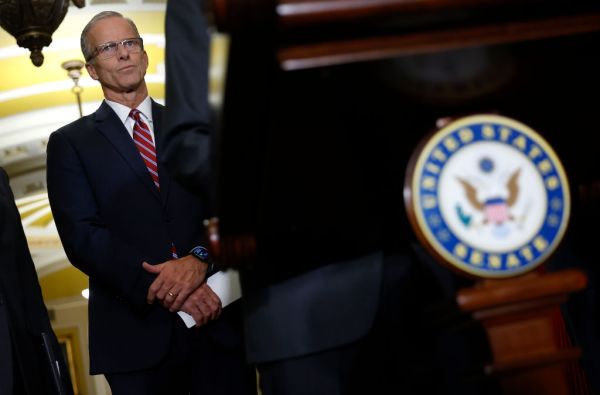
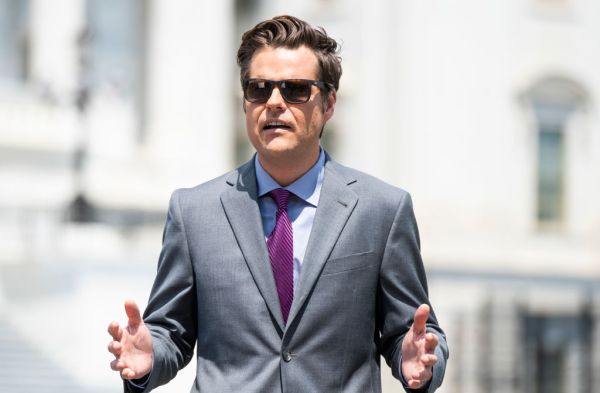
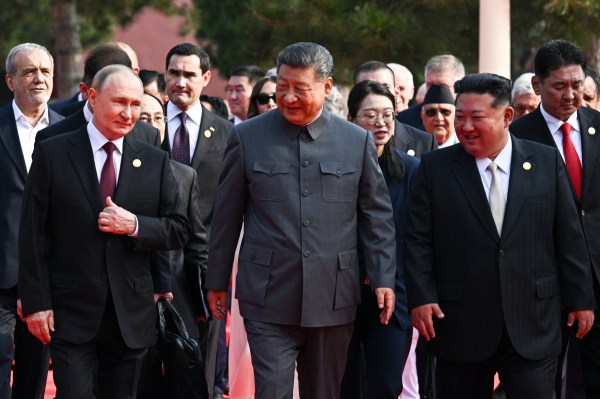
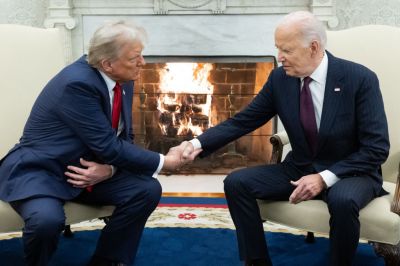
Please note that we at The Dispatch hold ourselves, our work, and our commenters to a higher standard than other places on the internet. We welcome comments that foster genuine debate or discussion—including comments critical of us or our work—but responses that include ad hominem attacks on fellow Dispatch members or are intended to stoke fear and anger may be moderated.
With your membership, you only have the ability to comment on The Morning Dispatch articles. Consider upgrading to join the conversation everywhere.